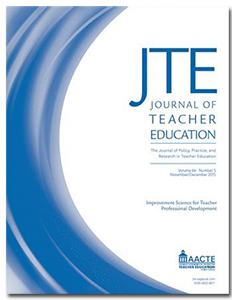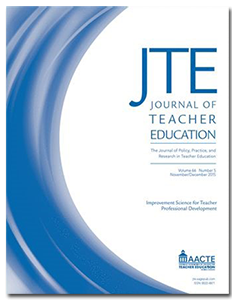07 Nov2016
Deadline extended: Please respond by December 2
By Sharon Lovell, Shelley B. Wepner and William Henk
The study of the education deanship and what is perceived as contributing to success in that key role is both timely and imperative. Such research can help standing deans reflect on their own characteristics and practices and perhaps adapt them to better effect. It can also assist prospective deans in understanding what capabilities figure to be necessary in increasing their leadership effectiveness should they assume these roles.
We invite your participation this month in a national survey, the “Deans’ Performance Belief Survey,” supported by AACTE. The purpose of this survey is to gauge education deans’ beliefs about the ways of thinking, being, and acting that are essential for doing their jobs.
01 Nov2016
By JTE Insider

Have you seen the JTE Insider blog managed by the Journal of Teacher Education (JTE) editorial team? Check out the entry below providing an overview of the September-October content – and watch your mailbox for the November-December issue, too!
In the editorial of the September/October 2016 issue of the Journal of Teacher Education, Coeditors Maria Teresa Tatto, Gail Richmond, and Dorinda Carter Andrews explore the role of research in teacher education.
31 Oct2016
By John F. Snyder
The views expressed in this article do not necessarily reflect the views of AACTE.
For future teachers, the job outlook is bright. For school hiring personnel, the challenge of finding enough qualified educators for their vacancies is daunting.
The growing mismatch between teacher supply and demand was documented strongly in a comprehensive report published by the Learning Policy Institute last month. One of the key data sources cited in the study is the American Association for Employment in Education (AAEE) “Educator Supply and Demand Report 2014-15,” which now has a new edition available—and the shortage situation has not improved.
31 Oct2016
By Amanda Lester
Please join me Tuesday, November 15, 1:00-2:00 p.m. EST for the third webinar in this year’s AACTE clinical practice series, “Advancing Science and Math Teaching in Diverse Elementary Classrooms: A Clinical Practice Model at San Francisco State University.”
Presenters Judith Munter, dean of the Graduate College of Education, and Stephanie Sisk-Hilton, associate professor of elementary education, will discuss the clinical preparation model at San Francisco State University (SFSU) centered around ensuring elementary education candidates and practicing elementary educators in their partner schools are highly prepared to teach science and math to an increasingly diverse population.
13 Oct2016
By Christine Tambini
AACTE has extended the application deadline for the 2017 Best Practice and Professional Achievement Awards until October 26! Now you have an extra 2 weeks to submit an entry through AACTE’s online submission site or to finish an entry you have already started. For detailed submission information, please refer to the official Call for Entries.
Our Best Practice Awards recognize your institution’s exemplary and innovative work in one of three areas:
12 Oct2016
By Jerrica Thurman

Time is running out to take advantage of the Early Bird Registration rate for AACTE’s 69th Annual Meeting in Tampa, Florida! This special offer expires October 19 at midnight EDT.
At the Annual Meeting, you’ll get a high value for your registration dollar. Hundreds of enriching sessions, networking opportunities, multiple meals and receptions, and access to the latest research and best practices are all included – giving you a great bang for your buck!
07 Oct2016
By JTE Insider
Have you seen the JTE Insider blog managed by the Journal of Teacher Education (JTE) editorial team? Check out the latest entry below.

This interview features insights from the JTE article “Social Justice and Teacher Education: A Systematic Review of Empirical Work in the Field”, written by Carmen Mills and Julie Ballantyne. The article is featured in the September/October issue of JTE.
04 Oct2016
By Amanda Lester
AACTE is excited to launch a new webinar series highlighting the experiences and findings of each of the 10 institutions in the AACTE Black and Hispanic/Latino Male Teachers Initiative Networked Improvement Community (NIC). Kicking off Thursday, October 20, 2:30 p.m.-3:30 p.m. EDT, the inaugural webinar is “Diversifying the Teacher Pipeline at MidAmerica Nazarene, Western Kentucky, and UConn: Lessons From AACTE’s NIC.”
The goal of this NIC is to identify and test strategies to increase the percentage of Black and Hispanic/Latino men receiving initial teaching certification through educator preparation programs. This webinar series will provide an inside look at the path of inquiry guiding the NIC’s work and process and how that has shaped and changed recruitment and retention of Black, Hispanic, and Latino male teacher candidates at each institution.
27 Sep2016
By Sarah Pistella
Tampa, Florida, is short 1,000 teachers this year. Nine out of 10 low-income schools have staffing deficits in special education. Across the United States this year, classrooms are in need of 60,000 teachers, and the number could reach 100,000 by 2018. These are among the sobering statistics presented at a national policy forum I attended September 15, sponsored by the Learning Policy Institute (LPI).
The event, “Solving Teacher Shortages: Attracting and Retaining a Talented and Diverse Teaching Workforce,” presented the latest staffing and enrollment data and what they mean for education – ranging from fewer classes and larger class sizes to the hiring of underqualified teachers. Various high-profile speakers explained that shortages are driven largely by attrition of teachers for reasons such as lack of respect and autonomy, poor working conditions, and inadequate pay and administrative support.
23 Sep2016
By JTE Insider

Have you seen the JTE Insider blog managed by the Journal of Teacher Education (JTE) editorial team? Check out the latest entry below.
This interview features insights from the JTE article “Engaging and Working in Solidarity with Local Communities in Preparing the Teachers of their Children,” written by Ken Zeichner, Michael Bowman, Lorena Guillén, and Kate Napolitan. This blog highlights the experience of authors Bowman (MB), Guillén (LG), and Napolitan (KN). The article is featured in the September/October issue of JTE.
19 Sep2016
By JTE Insider

Have you seen the JTE Insider blog managed by the Journal of Teacher Education (JTE) editorial team? Check out the latest entry below.
In this author interview, Alastair Henry discusses his article, “Conceptualizing Teacher Identity as a Complex Dynamic System: The Inner Dynamics of Transformations During a Practicum,” published in the September/October issue of JTE.
15 Sep2016
By Terrance McNeil

Congratulations to September Holmes Scholar of the Month Emily Rose Aguiló–Pérez, who just completed her Ph.D. in curriculum and instruction at Pennsylvania State University!
Aguiló–Pérez’s research interests are in children’s literature, girlhood studies, and Latino studies. The emphasis of her course of study was language, culture, and society in children’s literature, with a minor in women’s, gender, and sexuality studies. Her dissertation, Tracing Puerto Rican Girlhoods: An Intergenerational Study of Interactions with Barbie and Her Influence on Female Identities, was led by adviser Jacqueline Reid–Walsh.
15 Sep2016
By AACTE
Today, the Learning Policy Institute released a set of reports that present the latest data on U.S. teacher supply and demand and promote comprehensive recruitment and retention strategies to alleviate persistent shortages. AACTE commends the reports’ attention to the steep cost to students of understaffed schools, particularly in low–income communities, as well as the proposed solutions centered on high-quality clinical preparation of new teachers and reducing the attrition rate among practicing teachers.
School districts across the nation are struggling to staff classrooms with adequate numbers of skilled teachers, forcing them to make tough choices that shortchange students. Many educator preparation programs have stepped up recruitment and developed innovative partnerships with districts to meet local needs. Although these efforts are seeing some success, adjustments to the production end of the educator pipeline cannot compensate for the “leaky bucket” of practicing teachers who, according to the Learning Policy Institute, leave at a rate of nearly 8% per year.
14 Sep2016
By Dustin Wunderlich
The following article is reposted with permission from the University of Washington College of Education website. The views expressed in this article do not necessarily represent the views of AACTE.
As some advocacy groups push to deregulate the preparation of teachers and expand independent, alternative routes into teaching, a new policy brief authored by the University of Washington College of Education’s Ken Zeichner reviews what is known about the quality of five of the most prominent independent teacher education programs in the United States.
12 Sep2016
By Kristin McCabe
Mark your calendar for a special webinar September 29 about key roles for educator preparation providers (EPPs) in solving the nation’s persistent teacher shortages.
Offered by AACTE in partnership with the Learning Policy Institute (LPI), the webinar will highlight the latest enrollment and staffing data and promising models for programs and policies to improve educator recruitment, preparation, and retention.










